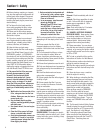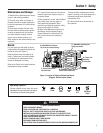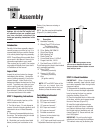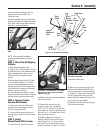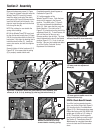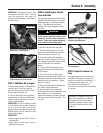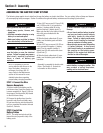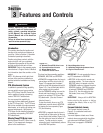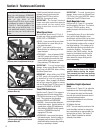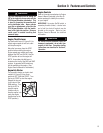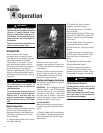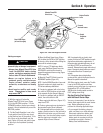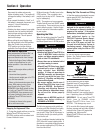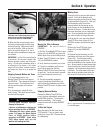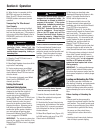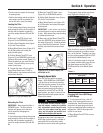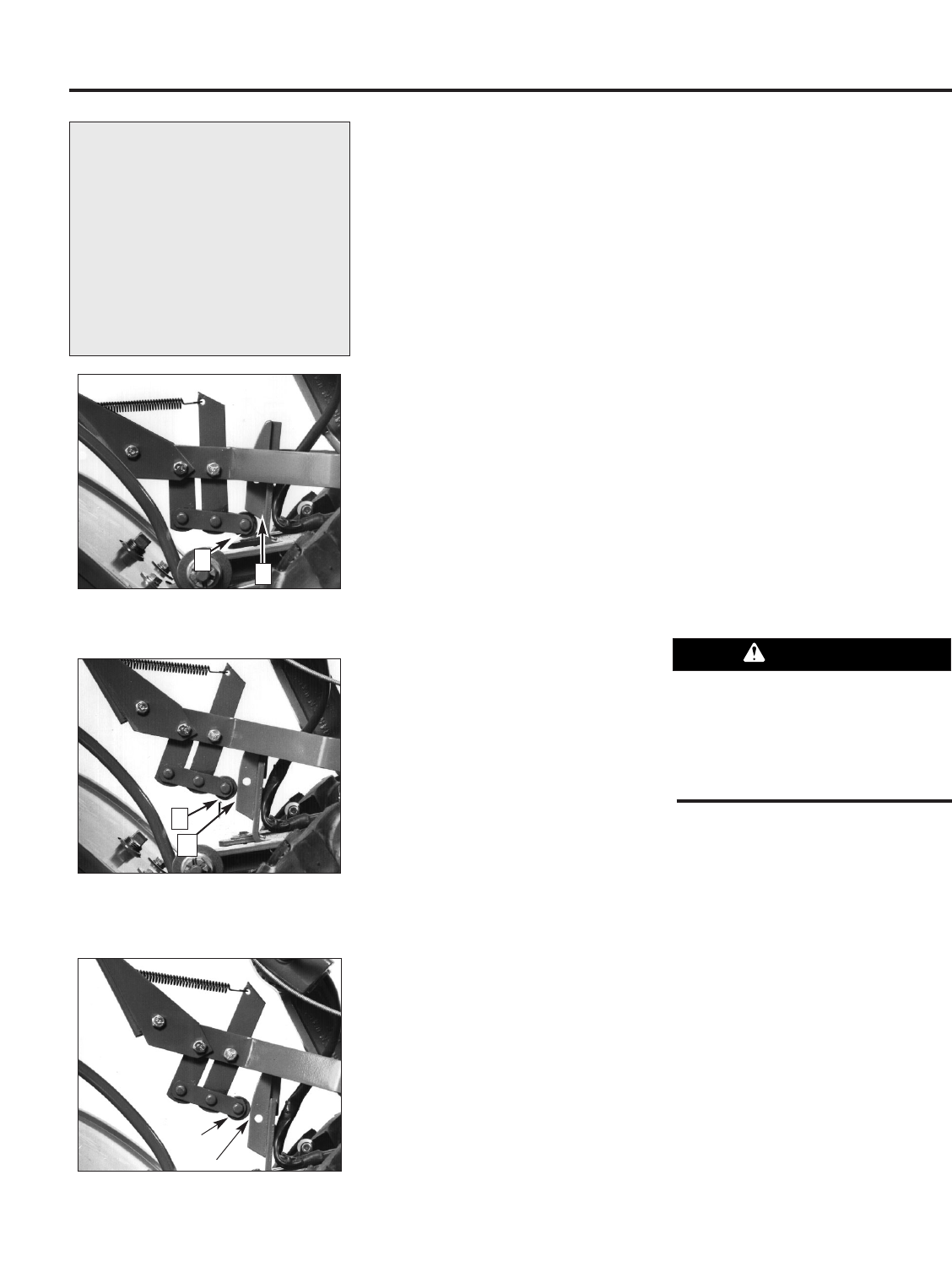
Section 3: Features and Controls
Figure 3-2: FORWARD position; roller
(G) rests under the adjustment block (H).
Figure 3-3: NEUTRAL position; roller
(G) rests against middle area of the ad-
justment block (H).
Figure 3-4: REVERSE position; roller
(G) rests against upper area of the ad-
justment block (H).
G
H
Verify Position of Clutch Roller
When you shift between FORWARD,
NEUTRAL and REVERSE, the clutch
roller at the base of the
Wheels/Tines/PTO Drive Lever should
be positioned as shown in Figures 3-2,
3-3 and 3-4. Verify the position of the
clutch roller as you shift the lever. If it
is not positioned correctly, contact the
Factory or see your local authorized
dealer.
G
H
G
H
12
If both Forward Interlock Levers are
released before first returning the
Wheels/Tines/PTO Drive Lever to
NEUTRAL, the engine will stop.
IMPORTANT: The Forward Interlock
Levers are a safety control that stops the
engine should you lose control while
going forward and cannot shift into
NEUTRAL.
Wheel Speed Lever
Use the Wheel Speed Lever (C, Fig. 3-1)
to select one of three operating positions:
SLOW, FAST or FREEWHEEL.
• SLOW – Lever moved all the way down.
Most effective for normal tilling or for
low-speed transport.
• FAST – Lever moved all the way up.
Most effective for cultivating or for fast-
speed transport.
• FREEWHEEL – Lever in between SLOW
and FAST (wheels will roll freely). Used
when transporting the machine on level
ground without engine power, and when
using stationary PTO attachments.
IMPORTANT: To avoid transmission
damage, always move Wheels/Tines/PTO
Drive Lever into NEUTRAL before shifting
the Wheel Speed Lever.
IMPORTANT: When shifting into SLOW
or FAST, gently roll the machine forward
or backward to help fully engage the
wheel gears. When engaged, the wheels
will not turn unless the engine is running
and the Wheels/Tines/PTO Drive Lever is
engaged in FORWARD or REVERSE.
Tines/PTO Clutch Lever
Use this lever (D, Figure 3-1) to engage or
disengage power from the transmission
PTO clutch to the tines or any PTO attach-
ment. This control has two operating
positions: ENGAGE and DISENGAGE.
• ENGAGE – Lever moved into detent slot
farthest from engine. Use this position to
operate tines or other PTO attachments.
After shifting to ENGAGE, briefly operate
machine in FORWARD to help fully
engage the PTO clutch.
• DISENGAGE – Lever moved into detent
slot nearest engine. Use this position to
disengage power to tines or other PTO
attachments before transporting, loading,
turning, or operating in reverse.
IMPORTANT: To avoid transmission
damage, always move the Wheels/Tines/
PTO Drive Lever into NEUTRAL before
shifting the Tines/PTO Clutch Lever.
Depth Regulator Lever
Use this lever (E, Figure 3-1) to regulate
the tilling depth of the tines. This control
also has a TRAVEL position, which
enables transport with the tines off the
ground.
To operate the lever, lift up on the handle-
bars, pull the Depth Regulator Lever
straight back, and then slide it up or down
to one of the eight detent height settings.
The eight detent positions offer a range of
tine height settings. This enables you to
select the height that is most effective for
a particular condition. The top detent
position is the TRAVEL setting. Use the
second or third detent from the top for
shallow tilling and cultivating. Use the
other detents for deeper tilling and for
power composting.
Handlebar Height Adjustment
Lever
Use this lever (F, Figure 3-1) to adjust the
handlebars to one of two height settings.
1. To change the height, hold the handle-
bars with one hand and loosen the lever in
a counterclockwise direction.
2. Move the handlebars to one of the two
preset height settings.
3. Retighten the lever.
NOTE: You can swap the positions of the
inside handlebar ratchets to change the
two preset settings by approximately four
inches higher or lower. See Section 2,
Step 2: Attach Handlebar for detailed
assembly information.
To avoid personal injury,
always place the tines in the TRAVEL
position before starting the engine.
This prevents the tines from touching
the ground until you are ready to begin
tilling.
WARNING



